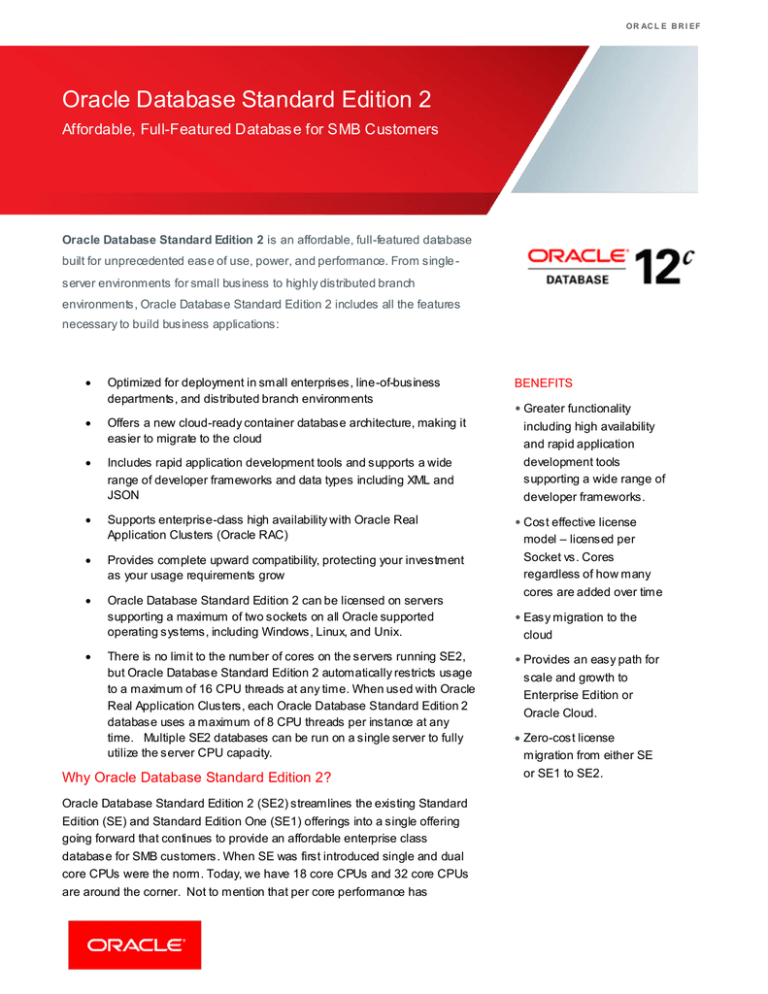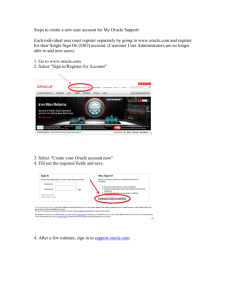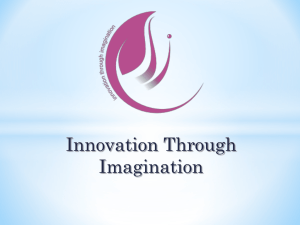
OR AC L E B R I EF
Oracle Database Standard Edition 2
Affordable, Full-Featured Database for SMB Customers
Oracle Database Standard Edition 2 is an affordable, full-featured database
built for unprecedented ease of use, power, and performance. From single server environments for small business to highly distributed branch
environments, Oracle Database Standard Edition 2 includes all the features
necessary to build business applications:
Optimized for deployment in small enterprises, line-of-business
departments, and distributed branch environments
Offers a new cloud-ready container database architecture, making it
easier to migrate to the cloud
including high availability
and rapid application
Includes rapid application development tools and supports a wide
range of developer frameworks and data types including XML and
JSON
development tools
supporting a wide range of
Supports enterprise-class high availability with Oracle Real
Application Clusters (Oracle RAC)
Provides complete upward compatibility, protecting your investment
as your usage requirements grow
Oracle Database Standard Edition 2 can be licensed on servers
supporting a maximum of two sockets on all Oracle supported
operating systems, including Windows, Linux, and Unix.
There is no limit to the number of cores on the servers running SE2,
but Oracle Database Standard Edition 2 automatically restricts usage
to a maximum of 16 CPU threads at any time. When used with Oracle
Real Application Clusters, each Oracle Database Standard Edition 2
database uses a maximum of 8 CPU threads per instance at any
time. Multiple SE2 databases can be run on a single server to fully
utilize the server CPU capacity.
Why Oracle Database Standard Edition 2?
Oracle Database Standard Edition 2 (SE2) streamlines the existing Standard
Edition (SE) and Standard Edition One (SE1) offerings into a single offering
going forward that continues to provide an affordable enterprise class
database for SMB customers . When SE was first introduced single and dual
core CPUs were the norm. Today, we have 18 core CPUs and 32 core CPUs
are around the corner. Not to mention that per core performance has
BENEFITS
• Greater functionality
developer frameworks.
• Cost effective license
model – licensed per
Socket vs. Cores
regardless of how many
cores are added over time
• Easy migration to the
cloud
• Provides an easy path for
scale and growth to
Enterprise Edition or
Oracle Cloud.
Zero-cost license
migration from either SE
or SE1 to SE2.
OR AC L E B R I EF
increased greatly. This offering takes into account the ongoing hardware trend
of increasing cores per socket. This trend has essentially made 4 socket
servers obsolete. Therefore, SE2 aligns us better with what customers are
using.
Cost and Scalability Advantage: Oracle Database Standard Edition 2 can be
licensed on servers with a maximum of 2 sockets . However, the core counts
per 2-socket server can increase over time without impacting customer license
obligation. With Oracle SE2, customer license costs remain the same
regardless of the number of cores in the socket. Each SE2 database is
automatically capped to use a maximum of 16 concurrent user threads. Since
most customers run multiple databases on a single 2-socket server to exploit
the full server CPU capacity, no matter how many databases they run on a
single server, their license obligation is for 2-sockets only.
What does this mean if I’m currently licensed to use Oracle
Database Standard Edition (SE) or Oracle Database Standard
Edition One (SE1)?
Investment Protection: You can choose to stay with SE or SE1, and Oracle
will continue to offer support as per our support policies as follows:
SE1 and SE for 11.2.0.4 are in extended support, which includes
patching, through the end of DEC-2020. Extended Support fees are
waived from Jan-2015 to 31-May-2017
SE1 and SE for 12.1.0.1 are in premier support, which includes
patching, through the end of AUG-2016. Sustaining support is then
available indefinitely.
Zero-Cost License Migration from SE: SE customers can choose to upgrade
to Oracle Database Standard Edition 2 without incurring any additional license
cost.
License migration from SE1: With a minor support cost uplift (20%), which
averages to about $500 per socket across all SE1 customers, SE1 customers
gain access to enterprise capabilities including RAC for high availability and
new features such as a container database architecture that makes it easy to
migrate to the cloud, and JSON support that enable big data analysis and
provide an enterprise class document store. Refer to the Database Licensing
Information for more details about the features including in this edition.
With SE, I could scale my license to up to 4 sockets, but I can
Copyright © 2015, Oracle and/or its affiliates. All rights reserved. Oracle and Java are registered trademarks of Oracle and/or its affiliate s. Other names
may be trademarks of their respective owners. Intel and Intel Xeon are tradem arks or registered trademarks of Intel Corporation. All SPARC trademarks
are used under license and are trademarks or registered trademarks of SPARC International, Inc. AMD, Opteron, the AMD logo, a nd the AMD Opteron
logo are trademarks or registered trademarks of Advanced Micro Devices. UNIX is a registered trademark of T he Open Group. 0615
OR AC L E B R I EF
only scale to 2 sockets with SE2?
A small percent of the install base uses SE with 4 socket systems. The most
common configuration is 2-socket. For the small percent of customers that do
run SE on 4 sockets systems , the following options are available:
Continue to stay with SE for their existing license and Oracle will
continue to support it as per support policies .
Consider an upgrade to Oracle Enterprise Edition or Oracle Database
Cloud Service.
Switch to a new 2-socket server (likely offering more processing
capacity).
Is it possible to license SE2 on a single processor of a 2 socket server?
Yes, SE2 can be licensed on a single processor of a 2 socket server
provided the server is hard partition (using any of the approved hard
partitioning technologies; see the Partitioning Document here) such
that Oracle program is not installed and/or running on the 2nd socket.
Is it possible to license SE2 on a single processor of a >2 socket server using
hard partitioning?
MORE INFOR MATION
No, Oracle Database Standard Edition 2 may only be licensed on
servers that have a maximum capacity of 2 sockets.
Is it possible to license SE2 (with RAC) across two 2 socket servers that have
only 1 socket populated on each?
Yes. If licensing by Named User Plus metric, DB SE2 minimums must
be met on each server. The minimums are 10 Named User Plus
licenses per server.
Please refer to the
following for more
information:
Oracle Standard Edition 2
Home Page
Database Licensing Policy
With SE/SE1 there was no limit on CPU threads but now there is a cap of 16
threads per database?
The bulk of SE and SE1 customers are utilizing 8 threads at most
today so the issues around threading caps are perhaps less critical
than it seems.
Better Value. Greater Functionality.
Copyright © 2015, Oracle and/or its affiliates. All rights reserved. Oracle and Java are registered trademarks of Oracle and/or its affiliate s. Other names
may be trademarks of their respective owners. Intel and Intel Xeon are tradem arks or registered trademarks of Intel Corporation. All SPARC trademarks
are used under license and are trademarks or registered trademarks of SPARC International, Inc. AMD, Opteron, the AMD logo, a nd the AMD Opteron
logo are trademarks or registered trademarks of Advanced Micro Devices. UNIX is a registered trademark of T he Open Group. 0615
OR AC L E B R I EF
Oracle Database Standard Edition 2 provides an affordable, full-featured
database with a multitude of new features and is built for ease of use, power,
and performance, providing an easy path for scale and growth to the cloud.
Copyright © 2015, Oracle and/or its affiliates. All rights reserved. Oracle and Java are registered trademarks of Oracle and/or its affiliate s. Other names
may be trademarks of their respective owners. Intel and Intel Xeon are tradem arks or registered trademarks of Intel Corporation. All SPARC trademarks
are used under license and are trademarks or registered trademarks of SPARC International, Inc. AMD, Opteron, the AMD logo, a nd the AMD Opteron
logo are trademarks or registered trademarks of Advanced Micro Devices. UNIX is a registered trademark of T he Open Group. 0615


